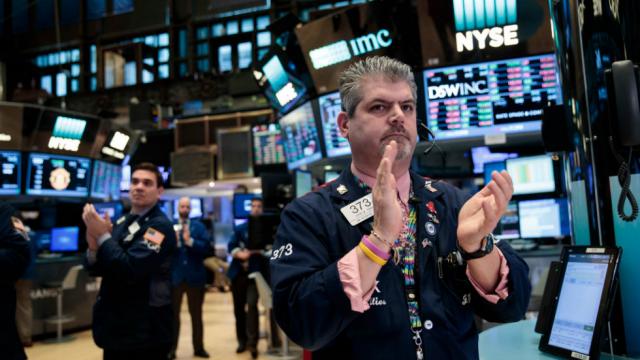
Democrats are emphasizing companies’ stock buybacks to help make their case against the GOP tax law ahead of the midterm elections.
The law is becoming more popular with the public and companies are touting employee bonuses, putting Democrats in a tough spot. That’s led them to highlight stock repurchasing announcements, which they say show the law’s benefits to wealthy shareholders and corporate executives dwarf any benefits to the middle class.
Republicans counter that stock buybacks also help middle-class Americans with retirement accounts and result in capital being reinvested in the economy.
The issue is quickly taking center stage in the election-year fight over the tax law.
The law, which President Trump signed in December, provides significant benefits to corporations. It cuts the corporate tax rate from 35 percent to 21 percent and also allows companies to bring money held overseas back to the U.S. at reduced tax rates. These changes help to boost the amount of cash companies have on hand.
According to Strategas Securities, companies have announced about $170 billion in buybacks this year. That’s higher than the $100 billion five-year average for buybacks in the first six weeks of a year. Companies that have announced buybacks include Cisco, Wells Fargo and PepsiCo.
The focus on buybacks has been particularly strong among Senate Democrats. Senate Minority Leader Charles Schumer (D-N.Y.) spoke about a boost in share buybacks in the wake of the tax law during a speech on the Senate floor on Wednesday.
“Why is that so significant? Because share buybacks don’t help the average worker,” Schumer said.
“They inflate the value of a company’s stock, which primarily benefits shareholders, not workers. It benefits corporate executives who are compensated with corporate stock, not workers who are paid by wages and benefits,” he added. “And the money corporations spend on repurchasing their stock is money that isn’t being reinvested in worker training, equipment, research, new hires, or higher salaries.”
Democrats also made stock buybacks the focus of the weekly address they released Friday. And they shined a spotlight on buybacks at a Senate Finance Committee hearing Wednesday when they grilled Treasury Secretary Steven Mnuchin, who was on Capitol Hill to discuss the president’s budget proposal.
Sen. Ron Wyden (D-Ore.), the top Democrat on the Finance Committee, noted that the value of share buybacks announced vastly exceeds the value of pay bonuses companies have touted.
“Members of this committee promised that middle-class paychecks would be bulging early in 2018,” Wyden said. “But instead the CEOs are funneling the tax windfall into buybacks that inflate the value of stocks held by affluent executives and wealthy shareholders.”
Later in the same hearing, citing the buybacks, Sen. Bob Casey (D-Pa.) asked Mnuchin if a mechanism should be in place to ensure employees see benefits from the tax law.
Mnuchin told the Finance Committee that employees’ wages would go up over the course of the year.
“We would not have expected that all to occur in the first month,” he said.
Mnuchin and other Republicans have also said that share buybacks aren’t a bad thing.
“To the extent that there are share buybacks, that’s capital that’s recycled back into the economy,” the Treasury secretary said. “It doesn’t sit in banks.”
Republicans also say that share buybacks can boost middle-class Americans’ wealth by lifting the value of stocks held in retirement accounts.
In a hearing with the acting IRS commissioner on Wednesday, Finance Committee Chairman Orrin Hatch (R-Utah) pushed back against Democrats for attacking share buybacks as things that will only benefit wealthy investors.
“Quite often, a business’s success or bottom line results in increased valuations of middle-class retirement accounts and pensions,” he said. “In fact, our private retirement system has been the biggest generator of middle-class wealth in our nation’s history. And, because more than one third of all corporate stock holdings in the United States are in various forms of retirement accounts, growing businesses contribute directly to the expansion of that middle-class wealth.”
Democrats, however, have pointed to a paper from New York University professor Edward Wolff that found the richest 10 percent of Americans own 84 percent of the value of stocks.
Democrats’ repeated hammering on stock buybacks comes amid growing support for the tax law since its enactment.
Companies’ announcements of bonuses in the wake of the law’s enactment have dominated headlines, and taxpayers this month are starting to see more money in their paychecks due to new guidance from the IRS on tax withholding.
Frank Clemente, executive director of the progressive group Americans for Tax Fairness, said that Democrats’ focus on buybacks is “a good message because it’s all about who are the winners and the losers in the tax bill.”
He said that companies are engaged in a sophisticated public-relations campaign with their bonus announcements, and that Democrats can counter that by telling the story of “what are corporations really doing with their money, which is they’re making the rich richer.”
But conservatives questioned Democrats’ focus on buybacks.
“I think it’s odd because when I hear stock buybacks, I hear my 401(k) goes up in value or my IRA goes up in value,” said Ryan Ellis, senior tax adviser at the Family Business Coalition.
Conservatives said that Democrats are scrambling to figure out what attacks on the tax law will stick.
They are “really reaching at straws,” said Americans for Tax Reform President Grover Norquist.

